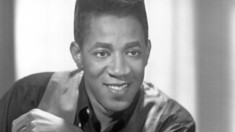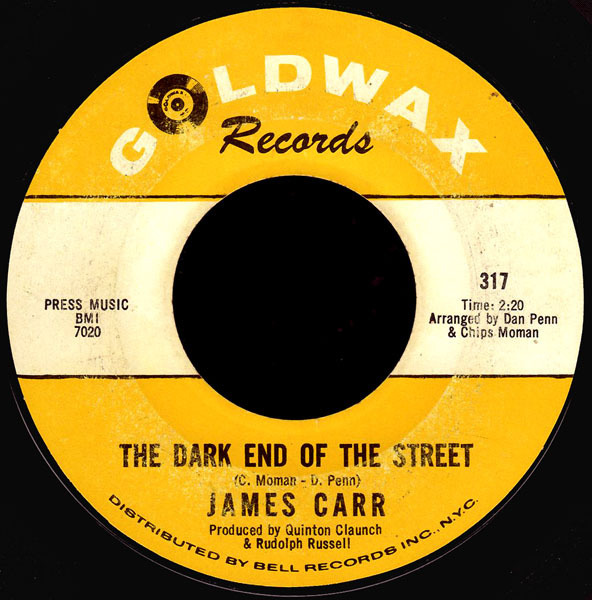Dressons rapidement le tableau :
1/ Un jeune chanteur noir de gospel analphabète
2/ Un petit label de Memphis tentant de faire de l'ombre à Stax
3/ Deux joueurs blancs de pokers passablement éméchés
Au final un chef d'œuvre absolu de Southern Soul.
Né le 13 juin 1942 près de Clarksdale (Mississipi), James Carr grandit à Memphis où il s’initie au chant à l’église. A côté de ses multiples petits boulots, il joue dans des groupes de gospel locaux comme les Harmony Echoes.

"I learned everything in church, It's not different from singing pop music. The only difference is that instead of calling on God, you're calling on a woman."
En 1962, sa rencontre avec Roosevelt Jamison, alors employé par l’hôpital de Memphis comme assistant technique, et manager à ses heures perdues, va contre toute attente lui faire connaître le succès. Après avoir tenté, infructueusement, d’entrer dans l’écurie de la mythique maison Stax, le jeune manager ne se laisse pas abattre pour autant. Suivant les conseils de l’avisé Jim Stewart (alors patron de Stax), Jamison se tourne vers la jeune maison de disque Goldwax Records.
Créé avec 600 dollars le 11 août 1964, par Quinton Claunch (ancien session man chez Sun) et par Doc Russell (pharmacien de Memphis…), la courageuse Goldwax est à la recherche de nouveaux talents. Claunch se souvient comment en 1964 les jeunes Carr et Jamison sont venus littéralement tapés à sa porte : "I heard a knock on my door about midnight," "So I got up,went to the door and there stood O. V. Wright, James Carr and Roosevelt Jamison."They told me Jim Stewart had sent them by and they'd like for me to listen to a tape. We sat down in the middle of the living room floor and the voices just knocked me out. I asked them what they had in mind and they said, `Man, we want to cut a record. "
Un premier 45 tours, "The Word Is Out (You Don't Want Me)", rencontre un succès d’estime. Les choses s’améliorent nettement avec le troisième 45 tours, « You’ve got My Mind Messes Up » qui figure dans les dix premiers du classement spécialisé rythm’n blues. Pourtant avec le succès, Phil Walden (manager d’Otis Redding), sentant le potentiel énorme de Carr, prend la place de Jamison comme manager. James perd un ami et sombre alors dans une profonde dépression.
Jamison témoigne : "They didn't know how he actually felt... how hard it was coming from the bottom, from nothing to something so fast. It was like coming from four or five years old to twenty five all of a sudden... within six months he came tumbling all the way down."
C’est pourtant à ce moment là, fin 1966, que James Carr va produire son chef d’œuvre : The Dark End of the Street.
Créé avec 600 dollars le 11 août 1964, par Quinton Claunch (ancien session man chez Sun) et par Doc Russell (pharmacien de Memphis…), la courageuse Goldwax est à la recherche de nouveaux talents. Claunch se souvient comment en 1964 les jeunes Carr et Jamison sont venus littéralement tapés à sa porte : "I heard a knock on my door about midnight," "So I got up,went to the door and there stood O. V. Wright, James Carr and Roosevelt Jamison."They told me Jim Stewart had sent them by and they'd like for me to listen to a tape. We sat down in the middle of the living room floor and the voices just knocked me out. I asked them what they had in mind and they said, `Man, we want to cut a record. "
Un premier 45 tours, "The Word Is Out (You Don't Want Me)", rencontre un succès d’estime. Les choses s’améliorent nettement avec le troisième 45 tours, « You’ve got My Mind Messes Up » qui figure dans les dix premiers du classement spécialisé rythm’n blues. Pourtant avec le succès, Phil Walden (manager d’Otis Redding), sentant le potentiel énorme de Carr, prend la place de Jamison comme manager. James perd un ami et sombre alors dans une profonde dépression.
Jamison témoigne : "They didn't know how he actually felt... how hard it was coming from the bottom, from nothing to something so fast. It was like coming from four or five years old to twenty five all of a sudden... within six months he came tumbling all the way down."
C’est pourtant à ce moment là, fin 1966, que James Carr va produire son chef d’œuvre : The Dark End of the Street.

Cette fabuleuse chanson est créée lors d’une Convention de disk jockey à Nashville. Ne sachant pas quoi faire, Dan Penn et Chips Moman, auteurs occasionnels de Goldwax Records, décident le soir d’aller dans la chambre d’hôtel de leur boss Claunch histoire de passer le temps.
"Chips and Dan Penn had come to my room poppin’ pills and playin’ poker- and they sat down and started to write a song. So I said 'boys, you can use my room on one condition, which is that you give me that song for James Carr. They said I had a deal, and they kept there word.”
Composé montre en main en 30 minutes, par le duo la chanson raconte une histoire d’adultère du point de vue des malheureux « fautifs » conscients du mal et de l’issue fatale de leur relation.
At the dark end of the street
that is where we always meet
hiding in shadows where we don't belong
living in darkness, to hide our wrong
You and me, at the dark end of the street
You and me
Carr amateur de chanson narrant des histoires va littéralement donner un souffle magique à ce morceau.
"It's really a simple song. Just sing it the way you talk. It's just easy, and I arranged it by the way I read it, the way I read the words. Didn't really have the music to it then, I arranged it by the way the words were."
Enregistré exceptionnellement au Royal Recording Studios (suite à une avarie technique au studio American Recording Studios initialement prévu), le morceau est rapidement enregistré (la deuxième prise est la bonne) au grand soulagement de Quinton Launch qui commence depuis un moment à s’inquiéter pour la santé psychologique de son poulain.
En effet, depuis le départ de Jamison l’instabilité et la depression de Carr s’accentuent.
« After they pushed me out and James got super sick - he came to me. He always kept my number in his mind, and he would call me from Atlanta or various places or if he was lost at an airport, drifting around the streets, wandering around, and he would call and ask me why wasn't I with him. »
En 1969, la maladie de James contribue grandement à accentuer les problèmes de Goldwax, les sessions d’enregistrement n’étant pas toujours à la hauteur des attentes de Quinton Claunch : "We had four good songs lined up, including 'To Love Somebody.' And that's the only damn song we got on the session. He just sat up there and looked. Man, I wanted to take a bottle and knock him off that stool. Time was going, we got all them high-priced musicians, and we finally got that one song. I don't see how he ended up singing as good as he did, but man, he sang the whole thing through, didn't have to overdub or nothing. And we didn't get anything else, didn't get nothing."
A part un unique single pour Atlantic en 1971, le public n’entendra plus parler de James Carr jusqu’en 1979 lors d’une tentative avortée de come back au Japon avec son ami Jamison. La tournée est rapidement annulée après que James lors du premier concert se trouva dans un état proche de la catatonie.
Roosevelt : « You have to realize, when we went to Japan to do those concerts, it was the first time James was to appear before an audience — a very large audience, in maybe... ten years. The band was from Memphis but they weren't really familiar with all of James' music. James was prescribed some medicine to calm his nerves and before he went on to perform, he took too much of it. It was a relaxant. He told me, "Man, I took too much of that medicine!" I looked and found he had taken a few more tablets than he was supposed to. He went on stage to do the show anyway, but when he started to sing it was like he was singing in slow motion... he kept on falling behind the band... it seemed to shock him. He just froze up. The band didn't know what to do so they stopped playing. It was so very sad. »
Après deux nouvelles infructueuses tentatives de retour dans les années 90, Carr s’éteint dans une institution médicale de Memphis le 7 janvier 2001.
Injustement oublié, James Carr reste l'une des plus belles voix de la musique noire américaine des années 60.
Comme le résume bien Claunch « He had a hard life, he felt the blues, man, that's for sure ».





 James Carr : The Dark End of The Street
James Carr : The Dark End of The Street
